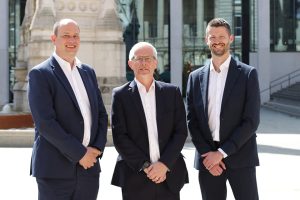Talking Business with Bob Edmiston

In the latest in a series of ‘Talking Business’ interviews, Bob Edmiston of IM Group chats to the editor of TheBusinessDesk.com Marc Reeves, and Steve Hollis, of KPMG Midlands
COMMENTThe business of civic engagement
The 2008-09 ‘Great Recession’ was the eighth economic recession to hit the UK economy since the Second World War. So what’s different about this most recent business cycle contraction? What is different is that political leadership across the globe is desperately looking for the economic growth button and this is proving to be increasingly illusive. All the tried and tested measures previously used have so far failed to move the growth needle this time around. Hence, and quite rightly, we are seeing a much greater willingness from government to engage constructively with proven wealth creators and big business. In the Midlands, more than ever before, we need to galvanise the collective business talent on our doorstep. With this talent there is a once in a lifetime opportunity to build the foundations for a more prosperous economy in the region in the future. The fusion of civic leadership and the private sector is creating a mix that has the potential to make a real difference to the way in which we can drive change for the better. The region’s ambitions are bold and transformational. We now need to make sure we capitalise upon the distinguished individuals that call the Midlands their home, to help carry that message to the heart of the government. Steve Hollis is regional chairman of KPMG in the Midlands |
BOB EDMISTON sums up his approach to business early on in our conversation. “A member of the Hyundai family once told me: ‘Bob it takes 10 years to build a good business. Why would you want to build a small one when you can build a big one? It takes the same amount of time’. “What he was saying was: ‘Don’t get involved in things that haven’t the potential to be big’.” Lord Edmiston (he took his seat in the House of Lords in January), is the man behind a number of highly successful ventures, the most prominent of which are IM Group, the car importer, and IM Properties. He is also a major force in philanthropy, founding the evangelical charity Christian Vision, and launching three Christian-based academies, including the Grace Academy in Solihull.
With his car importing business already feeling the effects of the recession, the Japanese tsunami added to Lord Edmiston’s challenges. He may have been forgiven for concentrating on his business interests and putting his philanthropic concerns on hold, but that couldn’t have been further from his mind. The Academy network keeps growing, as do his other commitments, such as chairing the board of governors at a Black Country school, not to mention becoming an active member of the House of Lords. So how can he take that approach when other businesses eschew ‘good causes’ to concentrate on simply staying in business? He said: “I wouldn’t be at all critical of the guys that need to concentrate on their businesses, particularly during a tough time like now. If they don’t keep their eye on the ball the whole thing’s going to go pear shaped and a lot of people are going to lose their jobs.” But there’s a clear upside of community engagement, he says: “I would argue that it’s actually quite gratifying to do it. I bumped into one of my academy students the other day and asked how she did in her exams. She said ‘I got an A star and two As and I’m going to university in Nottingham.’ That did me a power of good – there is a buzz you can get out of that which money really doesn’t buy.” “Not all businesses can give that degree of involvement. Sometimes all they can do is write the cheque and that’s fine.” Could the government do more to make it easier for businesses to get engaged? “The government does support in terms of tax relief and that’s a good thing. Maybe they could do a bit more, but in the UK somehow philanthropy seemed to become a bit of a dirty word. In America, it’s regarded as something a lot more honourable, but here everyone’s suspicious of your motives. But this present government is very much on the page of acknowledging the role of both private individuals and voluntary organisations which I think can probably help communities operate more cost efficiently and with greater passion and outcomes. “What is sad is when the cuts came, some local authorities decided to cut the support to voluntary organisations rather than some of their own fat.” One of Edmiston’s traits is optimism. It comes through when he’s talking about the people helped through his charitable interests, but also in his approach to business and the current economic crisis. He said: “I think a crisis is a time of great opportunity. It’s a time when you make changes very quickly. Remember the Falkland’s War – they said ‘We need a midflight refuelling system for the Harrier.’ In peacetime, it would’ve taken three years but they did it in three weeks.”
But what of the human cost of the downturn? “Almost every business has had to lose some people – as have we – but it’s amazing how you manage without them. Years ago, we never had mobile phones, emails and all that to increase efficiency. There wasn’t a lot in our company but we’ve had to get rid of some good people and I’m sad about that because some of them were with us for 35 years.” That long history has tracked the changes to the UK car industry, and particularly the impact of foreign imports. IM grew out of Edmiston’s original business, Jensen Parts and Service, serving the after-market needs of owners of the iconic West Bromwich-built brand – which was fine, until Jensen went bankrupt. “Of course selling parts for a company that no longer makes cars gives you a very short lifespan,” Edmiston observes. So in the mid-1970s, Edmiston turned to the East, and rode the tide of Japanese imports that was just getting underway. “We decided what we needed was a product to sell and we managed to get the Subaru franchise at the inception of Japanese cars coming into this market.” New import controls were a gift to Edmiston: “At that time, it was really a licence to print money because we’d got a restricted supply and a demand that well exceeded that supply, so we didn’t have to discount the cars at all. So that was a great time and there were times when we made 25% net profit. “And it was growing and, of course, the British motor industry was really producing some pretty awful cars at that time. “But it’s not always an easy ride when your product has to travel from the other side of the globe. “It didn’t last for long but it was nice while it did,” he said. “But then there were massive currency fluctuations. We’re very exposed to currency so in the last couple of years we’ve suffered very badly because the pound has gone down, the yen has gone up and our costs have virtually doubled. “Now how do you deal with that? You can cut staff, you can cut advertising, or you can concentrate on bringing in your more expensive cars because they’re the ones with the bigger margin. So our basic cars we can’t bring in anymore hence our sales are going down.” He has also had to concentrate on dealer margins and the spare parts business, and IM’s initiatives in other parts of Europe, such as Scandinavia, has distributed the risk. But then the tsunami hit Japan. “There was a factory that made nearly half the world’s production of a particular type of chip used in cars. That was in the area that the tsunami hit. “You can’t just open a new chip factory overnight. We’ve had no production for four or five months, so it’s been a bad year for us because we’re trying to make what stocks we’ve got last.” But, always on the move, Edmiston is looking at new markets, has opened an office in China, and will be importing Chinese vehicles within the year, he says. He said: “We’ve got growth in the world’s population, among those who are economically active – especially in China and India.” “This will drive inflation in these territories and rebalance the trading relationship between West and East, opening up new export opportunities for UK companies. “We have to deregulate, in order to become more competitive and we have to be thinking about sending stuff to them rather than them sending stuff to us. We have to change our mindset. “One hundred years from now I think we’ll be making a lot more because manufacturing in China and India will be much more expensive.” Having conquered industry and philanthropy, Edmiston is taking his approach into the corridors of power. It’s not his first foray into politics, of course, having been a member of the Tory-supporting Midlands Industrial Council. So what’s it like doing business in the House of Lords? “‘Doing business’ is an interesting way of putting it,” he said. “In business, you have a discussion then you go and do it. In the House of Lords, you of course have a discussion then there’s going to be a lot more discussion and then it’ll go back to the House of Commons then it’ll come back to the House of Lords. “So it’s a whole different mindset from being a businessman. It’s frustrating, but everything that’s decided there affects the whole of the country, so I’m not in any way denigrating it. It’s very necessary and very important, but as a businessman it’s a huge adjustment.” With a career that spans decades and encompasses business, philanthropy and politics, it’s unlikely that Lord Edmiston will be lacking in things to speak about. SectorsCommentsIf you'd like to leave a comment, please register now for free or login
|



 Scale and impact are indeed the hallmarks of these endeavours, with IM Group the dominant importer of Japanese cars into the UK, and IM Properties notching up a portfolio worth more than £1bn across the UK, France and the US.
Scale and impact are indeed the hallmarks of these endeavours, with IM Group the dominant importer of Japanese cars into the UK, and IM Properties notching up a portfolio worth more than £1bn across the UK, France and the US.







